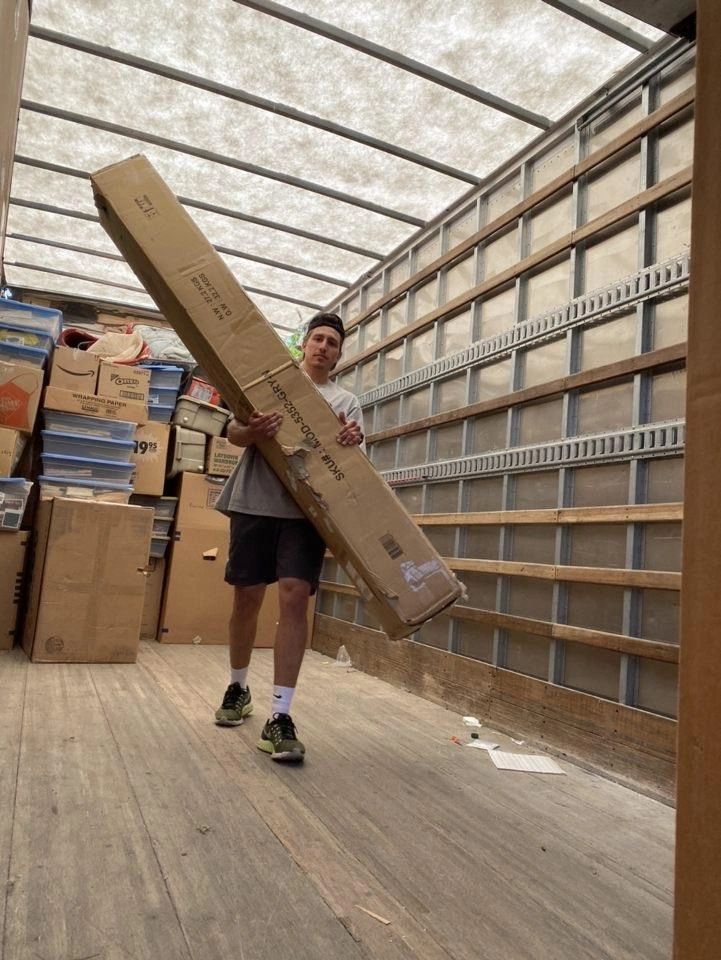Understanding the Inclusions of moving and Freight Forwarding on the planet of Residential and Worldwide Shipping
Steering with the intricacies of moving and Freight forwarding can be tough. Both procedures involve unique procedures and needs that are vital for effective transportation. Understanding the distinctions in logistics, paperwork, and risk management is essential for people and services alike. This knowledge can significantly influence the effectiveness and safety of deliveries. Several are uninformed of the details elements that influence the total experience and outcomes. What factors should one consider to assure a smooth changeover?
The Essentials of moving and Freight Forwarding
moving and Freight forwarding are basic components of the international logistics market. They help with the transfer of products and personal belongings across international and residential boundaries. moving mainly involves the relocation of individuals or families, encompassing commercial and domestic demands. It typically includes packing, filling, transferring, and unloading things at the location. In contrast, Freight forwarding is concentrated on the delivery of items, frequently wholesale, utilizing numerous transport modes, such as air, sea, or land.Freight forwarders serve as middlemans, working with logistics to assure timely distribution while steering through complex policies and customizeds treatments. Both processes require careful planning, organization, and communication to guarantee performance and minimize disruptions. Understanding these fundamentals is important for anybody involved in logistics, as they prepared for more advanced aspects of delivery and transport administration.
Secret Parts of Freight Forwarding Solutions
Freight forwarding services encompass several critical parts that assure smooth transport of products. Key responsibilities of Freight forwarders consist of handling logistics, collaborating deliveries, and taking care of personalizeds clearance. In addition, recognizing vital delivery paperwork is important for conformity and reliable motion of cargo.
Freight Forwarder Responsibilities
A reputable Freight forwarder plays a vital role in collaborating the transportation of items, making sure that shipments are taken care of effectively and in conformity with policies. Their responsibilities incorporate different vital jobs, including selecting ideal transport routes, negotiating Freight rates, and managing logistics. They serve as middlemans in between service providers and carriers, guaranteeing that freight is correctly packaged and classified for safe transportation. Furthermore, Freight forwarders track shipments, providing updates to customers about the condition and anticipated delivery times. They additionally evaluate and handle risks connected with transportation, recommending insurance coverage choices as needed. By promoting communication and documents, Freight forwarders enhance the shipping procedure, reducing prospective hold-ups and enhancing general supply chain performance.
Shipping Paperwork Basics

Understanding Customs Clearance and Paperwork
Accurate documents is important in the customs clearance procedure, as it ensures conformity with different regulations. An introduction of customizeds laws highlights the intricacies faced by shippers and Freight forwarders. Usual clearance difficulties can greatly affect delivery timelines and expenses, making understanding this aspect crucial for effective logistics.
Relevance of Accurate Documents
Guiding through the complexities of global shipping needs an eager understanding of customizeds clearance and the critical function of documents. Accurate paperwork is crucial for making sure that deliveries follow laws and reach their destinations without delays. Effectively prepared documents, consisting of costs of lading, commercial invoices, and packaging checklists, facilitate smooth interactions with personalizeds authorities. Inaccuracies can result in delivery delays, penalties, and even confiscation of goods. Furthermore, thorough documentation aids in tracking shipments and settling disputes. Consequently, companies participated in moving and Freight forwarding need to focus on careful paperwork practices to browse the detailed landscape of global delivery properly. This persistance not just enhances operations yet additionally improves customer contentment by ensuring timely distribution.
Customs Regulations Summary
Steering custom-mades laws is an essential facet of global trade that straight influences the success of moving and Freight forwarding procedures. Effective custom-mades clearance needs an understanding of different regulations, including tariffs, duties, and import/export restrictions. Accurate documents is necessary, as it ensures compliance with lawful requirements and promotes the reliable motion of goods throughout boundaries. Key records commonly include industrial billings, packing listings, and costs of lading, which supply thorough information regarding the delivery. Additionally, customs brokers play a vital duty in steering complex policies, acting as middlemans between custom-mades and carriers authorities. By keeping complete knowledge of custom-mades processes, businesses can substantially decrease delays and reduce prices linked with global shipping.
Usual Clearance Difficulties
Numerous difficulties can emerge during the custom-mades clearance process, often complicating the motion of products across borders. One significant problem is not enough documents, which can bring about hold-ups and fines. Merchants and importers must ensure all called for documentation, such as invoices, packing checklists, and certificates of beginning, is full and precise. In addition, discrepancies in valuation can cause scrutiny from customizeds authorities, leading to added tasks or examinations. Language obstacles may likewise posture obstacles, as miscommunication can cause misunderstandings concerning regulations. In addition, adjustments in custom-mades regulations can create complication, requiring constant alertness by shippers. Inevitably, getting over these clearance challenges requires extensive preparation and a clear understanding of customs needs to assist in smooth worldwide deals.
Product Packaging and Labeling Requirements
Although often ignored, product packaging and labeling demands play an important role in the delivery process, ensuring that items are secured and easily recognizable throughout their journey. Correct packaging safeguards things from damage throughout transportation, while likewise facilitating reliable handling and storage. Making use of appropriate products, such as bubble cover, foam, or durable boxes, can protect against damage and loss.Labeling is equally important. Clear and accurate tags convey vital details, including the destination, handling instructions, and materials. Tags should abide with regulations particular to residential and international delivery, which may include dangerous materials best moving companies in us recognition or custom-mades declarations.Moreover, standard labeling techniques simplify the tracking process and enhance overall logistics performance. By adhering to packaging and labeling requirements, organizations decrease the risk of hold-ups, damages, or misdelivery. Ultimately, these practices contribute significantly to the success of moving and Freight forwarding operations, making sure a smooth delivery experience for all events entailed
Tracking Deliveries: Relevance and Methods
Effective packaging and labeling set the foundation for successful shipment management, but tracking deliveries is equally vital in the shipping process. Shipment monitoring provides real-time presence, which helps businesses and customers check the progression of their products. This openness improves customer fulfillment, given that customers can stay informed about delivery timelines and any kind of possible delays.Several methods assist in reliable tracking. Barcode scanning is a common technique, using one-of-a-kind identifiers to keep track of bundles throughout their journey. In addition, general practitioner innovation enables precise area monitoring, enabling timely updates and improved logistics monitoring. Lots of shipping firms now offer electronic systems and mobile applications that provide customers with simple accessibility to tracking information.The value of shipment tracking can not be overstated; it decreases the danger of lost or harmed items, improves functional effectiveness, and fosters trust between carriers and receivers. Incorporating effective monitoring approaches is important for effective residential and international delivery procedures.
Insurance policy Options for Your Goods
Protecting insurance policy for goods en route is a vital consideration for services and people alike. Insurance coverage options differ based upon the kind of shipment, value of products, and certain dangers entailed. Usual kinds consist of service provider liability, which covers loss or damages while in transportation, and full-value insurance policy, offering comprehensive insurance coverage for the complete value of the goods.Shippers may likewise take into consideration aquatic insurance policy for global shipments, safeguarding against dangers related to sea transport. It is important to assess the certain demands of the delivery and examine the terms of any type of policy.Furthermore, recognizing exemptions and limitations is crucial to avoid potential gaps in insurance coverage. Carriers need to engage with insurance professionals to discover customized options that fit their special circumstances. Inevitably, spending in the appropriate insurance coverage can alleviate financial risks and give assurance during the delivery procedure.
Choosing the Right moving and Freight Forwarding Solution
When choosing a moving and Freight forwarding service, it is important for individuals and businesses to thoroughly evaluate their details needs and priorities. Variables such as the volume of goods, location, and timeline play a considerable role in this decision-making process. Looking into different companies is advisable; contrasting their services, rates, and consumer reviews can reveal beneficial insights.Additionally, it is required to take right into account the experience and proficiency of the company in managing specific kinds of cargo, particularly for global shipments that might include customs clearance. Transparency in rates, including any type of surprise charges, need to likewise be scrutinized.Furthermore, reviewing the level of client assistance offered is necessary, as timely interaction can alleviate concerns during transit (freight shipping). Finally, confirming the availability of insurance coverage alternatives guarantees that goods are secured throughout the shipping procedure. By taking these individuals, companies and steps can make informed choices that align with their logistics demands
Often Asked Questions
What Types of Goods Can Be Shipped Internationally?

Exactly How Do Shipping Prices Differ In Between Various Providers?
Delivering expenses vary significantly between service providers because of variables such as solution rate, freight type, range, redirected here and additional solutions offered. Each provider's pricing design mirrors these variables, influencing total shipping costs for consumers.
Can I Ship Hazardous Materials or Perishables?
Shipping unsafe materials and perishables goes through strict policies. Service providers commonly call for particular product packaging, labeling, and documents. Shippers need to assure compliance with global and local legislations to stay clear of charges and assure safe transport.
What Should I Do if My Shipment Is Postponed?
When encountered with a shipment delay, one need to initially get in touch with the provider for updates. After that, assess any kind of notifications received, evaluate alternate services, and maintain all parties informed concerning the situation to minimize disruptions.
Exist Weight Purview for Delivery Containers?
Weight restrictions for delivery containers vary depending upon elements like container dimension and delivery regulations. Typically, common containers have an optimum gross weight of around 30,000 to 32,000 kgs to guarantee secure transport and handling. In comparison, Freight forwarding is focused on the shipment of items, usually in mass, utilizing numerous transport modes, such as click reference land.freight, sea, or air forwarders act as middlemans, collaborating logistics to guarantee prompt shipment while steering with complex regulations and personalizeds procedures. Key duties of Freight forwarders consist of handling logistics, collaborating deliveries, and dealing with customizeds clearance. A dependable Freight forwarder plays a vital role in collaborating the transportation of items, making sure that shipments are taken care of effectively and in conformity with policies. Reliable packaging and labeling established the foundation for effective shipment monitoring, but tracking deliveries is equally vital in the shipping process. Many shipping firms now use digital platforms and mobile applications that provide individuals with very easy access to tracking information.The relevance of shipment tracking can not be overemphasized; it minimizes the danger of shed or harmed goods, enhances functional efficiency, and fosters trust between recipients and shippers.
Comments on “Domestic shipping processes made easy: What your business needs to do”